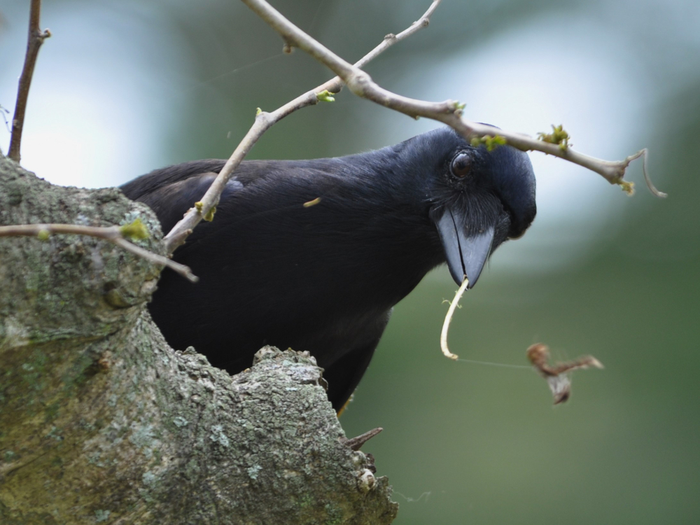Just like humans, New Caledonian crows are particularly careful when handling their most valuable tools, according to a new study by researchers from the University of St Andrews and the Max Planck Institute of Animal Behavior in Konstanz, Germany. The research reveals that crows are more likely to store relatively complex and efficient foraging tools for future use than more basic tools.

Credit: James St Clair
Just like humans, New Caledonian crows are particularly careful when handling their most valuable tools, according to a new study by researchers from the University of St Andrews and the Max Planck Institute of Animal Behavior in Konstanz, Germany. The research reveals that crows are more likely to store relatively complex and efficient foraging tools for future use than more basic tools.
New Caledonian crows are renowned for using different types of tools for extracting prey from tree holes and other hiding places. While they firmly hold their tools in the bill during foraging, they need to put them down to eat. This is when crows are at risk of losing their tools by accidentally dropping them or having them stolen by other crows.
In an earlier study, the researchers from the School of Biology at the University of St Andrews in the UK had shown that crows keep their tools safe when not needed, using one of two ‘safekeeping’ strategies – they either securely hold them trapped underfoot, or they temporarily insert them into a nearby hole or behind bark. But are crows more careful when handling particularly valuable tools?
Handle with care
“Many of us will fuss about a brand-new phone, making sure it does not get scratched, dropped or lost. But we may handle an old phone with a cracked screen quite carelessly,” said lead author Barbara Klump, who is now based at the Max Planck Institute of Animal Behavior, Germany.
Crows at one of the team’s long-term study sites use two different kinds of stick tools: complex hooked tools and basic non-hooked tools. The former are painstakingly crafted from a relatively scarce plant species, while the latter are simply twigs and leaf petioles sourced from the forest floor. “Hooked tools are not only more costly to obtain, but they are also much more efficient,” explained team leader, Christian Rutz. “Depending on the foraging task, crows can extract prey with these tools up to ten times faster than with bog-standard non-hooked tools.”
Keeping valuable tools safe
In their new study, the researchers now discovered that New Caledonian crows are more likely to keep valuable hooked tools safe between uses than the more basic non-hooked tools. “It was exciting to see that crows are just that bit more careful with tools that are more efficient and more costly to replace. This suggests that they have some conception of the relative ‘value’ of different tool types,” noted study co-author James St Clair.
This is the first study to investigate how animals handle and store tools of different kinds, providing an innovative way to measure how much they value these objects. The method has huge potential for investigating the behaviour of other tool-using animals, including our closest relatives, the chimpanzees.
Journal
eLife
DOI
10.7554/eLife.64829
Method of Research
Observational study
Article Title
New Caledonian crows keep ‘valuable’ hooked tools safer than basic non-hooked tools
Article Publication Date
21-Dec-2021




